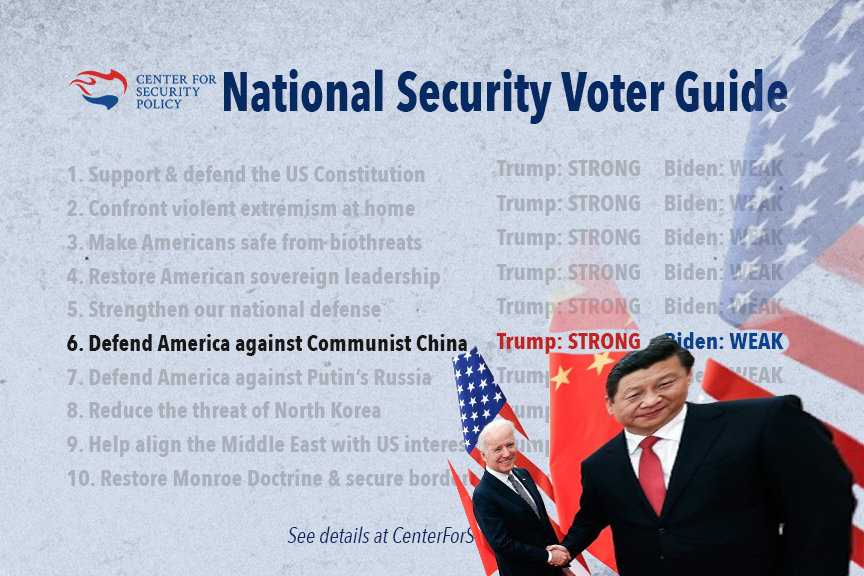National security rating #6: Defend America against Communist China

The rise of Communist China so fundamentally threatens the United States from almost every conceivable angle that defense against it is a core criterion for evaluating American leadership. The presidential candidates’ stances on defense of America against Communist China is the next on our 2020 National Security Voter Guide list.
Mainland China is ruled by a one-party regime with no checks and balances to its power. The Chinese Communist Party (CCP) poses an existential threat to the United States.
Every president since Nixon has, for differing reasons, assisted the rise of the CCP. Early goals in the 1970s and ‘80s were to take the “enemy of my enemy is my friend” approach and use the People’s Republic of China to place the Soviet Union in a box. This was also the period when American businesses built relations with the CCP, and parlayed those relations to influence policymakers in Washington. The CCP expanded those relations to reverse roles and corrupt American policymaking. Both political parties were and remain complicit.
The issues we considered are: strengthening the CCP to become a threat to the United States, and continuing to strengthen the CCP after that threat had become established; depleting American industry of jobs and infrastructure, and transfer US strategic industries to the CCP; enriching the CCP financially and permitting it to infiltrate and influence American financial institutions; permitting the CCP to wage aggressive political, military, economic, and industrial espionage against the United States through exchanges, scholarships, study and research programs, and other means; permitting the CCP to compromise US capital markets; technology transfer to provide the CCP with a qualitative military advantage over the US; policies toward the CCP’s global Belt and Road initiative; policies to help China’s neighbors defend their sovereign interests without undue US involvement; CCP subversion of international organizations; and response to the CCP’s spread of the 2020 pandemic.
Joe Biden. On the Senate Foreign Relations Committee and as vice president, Joe Biden was an energetic promoter of building ties with the CCP, and said and did little if anything to counter CCP power and influence against American interests in any of the above areas. He even praised the rise of the Chinese Communist Party as a good thing. As the pandemic spread, Biden opposed President Trump’s travel restrictions on China as “nakedly xenonphobic” until he changed his mind and agreed with Trump. And then there’s the scandal of his son Hunter taking $1.5 billion in CCP money apparently as part of a influence op to shape US policy. Joe Biden is weak on China. Fewer American leaders have a worse record.
Donald Trump. President Trump in less than four years has started to turn those problems around. He is the first American president to attack the Chinese Communist Party as an institution. He properly blamed the CCP for the pandemic and held it responsible. He has embargoed CCP products and services, imposed sanctions and tariffs, begin a broad interagency counterintelligence offensive against CCP espionage networks embedded in American institutions; cracked down on CCP disinformation, propaganda and influence operations; expelled Chinese military personnel and spies from US universities; started to tackle the problem of the CCP in US capital markets and government pension investments; squeezed the CCP hold on critical minerals and directly attacked the CCP’s “Made in China 2025” strategy for global manufacturing superiority.
Trump stopped CCP penetration of 5G telecom in the US and among key allies by attacking Huawei. He began to stem the spread of Belt and Road and to strengthen China’s neighbors, not only traditional allies like Japan and South Korea, but increased recognition of Taiwan and built new and powerful relations with India. Once the pandemic began his administration held the CCP specifically accountable and began withdrawing the US from CCP-subverted international groups like the World Health Organization. He also reconfigured the US military, expanding the US Pacific Command to become the US Indo-Pacific Command. And he challenged the Republican party establishment about its fetish toward Beijing.
Defend against Communist China – Trump: Strong. Biden: Weak.
- I infiltrated radical groups 40 years ago. Leftists are desperate for martyrs - February 6, 2026
- Chinese spies ‘sham marriage’ scandal exposes ‘targeted’ national security threat at major US base: Waller - January 27, 2026
- The “Donroe Doctrine” In Action - January 7, 2026
